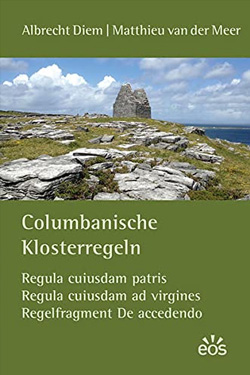Columbanische Klosterregeln: Regula cuiusdam patris, Regula cuiusdam ad virgines, Regelfragment De accedendo
Albrecht Diem
Eos, December 2016

This book is a study and German translation of three seventh-century monastic rules published after the time of Columbanus: "the Regula cuiusdam patris," "Regula cuiusdamad virgines" and the treatise "De accedendo ad Deum."
In the introduction, Professor Albrecht Diem argues that all three texts assert different claims to define the heritage of the Irish monk and monastic founder Columbanus, and give different responses to the theological and practical challenges Columbanian monasticism faced after his death in 615.
The "Regula cuiusdam patris" can be read as an angry polemic against the course Columbanian monasticism took, and might be associated with Agrestius, one of the antagonists of Columbanus’ successor Eusthasius of Luxeuil. The "Regula cuiusdam ad virgines" was probably written by Jonas of Bobbio as a counterpart to his "Life of Columbanus." Both texts together form the program of Columbanian (or Hiberno-Frankish) monasticism as propagated by Jonas. "De accedendo ad Deum" may have originally been a chapter of the "Regula cuiusdam advirgines." As such it would form the theological core of the rule.
The text provides a highly elaborate rationale for why and how monastic discipline enables a community to pray effectively for forgiveness of sins, to perform intercessory prayer and to attain salvation.